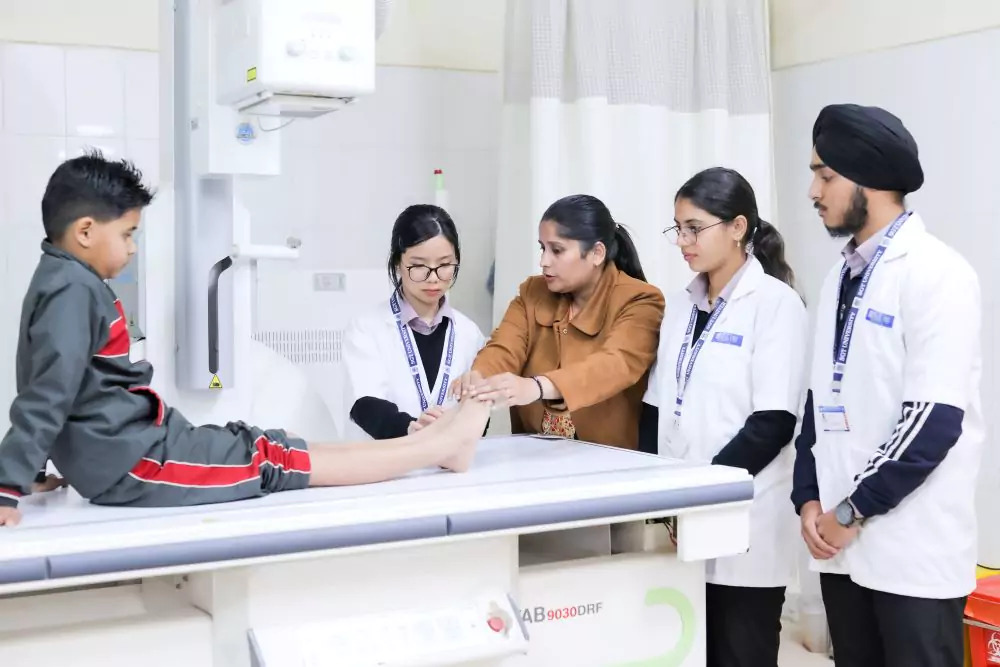Introduction
In medical emergencies, every second counts, and behind every saved life, there’s a trained emergency care professional working with skill, precision, and swiftness. With the expansion of healthcare systems and the development of emergency response, the need for well-trained trauma and critical care specialists is increasing across hospitals, ambulances, and disaster areas.
This is where an MSc in Emergency & Trauma Care Technology comes as an essential and life-saving career path. So, if you are a person who prospers in high-stress scenarios and is willing to make a real difference, a specialized course will provide a future filled with meaning and possibility. SGT University, one of the best colleges for emergency trauma care, equips students with theoretical and practical knowledge, which prepares them for real-life emergencies.
Course Overview
The MSc Emergency & Trauma Care Technology is a 2-year postgraduate degree program, mainly designed to equip students with the clinical and technical expertise needed to attend to patients in critical and emergency conditions.
What You’ll Learn:
Trauma care measures and emergency medical protocols
Advanced Cardiac Life Support (ACLS) and Basic Life Support (BLS)
Disaster management and triage systems
Intensive care observation, pre-hospital care
Management of airway, resuscitation, and management of shock treatment
Medical ethics, pharmacology, and medico-legal aspects
Hands-on training in ICUs, trauma, and emergency rooms
This course equips students to practice in the most urgent and time-sensitive area of the healthcare system, involving collaboration with emergency physicians, trauma surgeons, and paramedics.
Career Scope in Emergency and Trauma Care
The emergency medical career scope is expanding rapidly across both public and private sectors of the healthcare system in India and the rest of the world.
Top Career Roles Include:
Emergency & Trauma Care Technologist: Work in ERs and trauma departments together with physicians
Critical Care Technician: Aid in ICUs and high-dependency units (HDUs)
Ambulance Emergency Medical Responder (EMR) Worker: Render pre-hospital life-saving care
Disaster Management Officer: This is an official whose job is to coordinate medical care in a mass emergency
Paramedical Supervisor: Head trauma teams, emergency clinical workplaces where the pressure is high.
Medical Emergency Trainer: Train other staff on BLS, ACLS, and Emergency procedures
Clinical Coordinator/Quality Officer: Hospital management of trauma response systems
International Opportunities: with certifications, work in emergency care abroad
Graduates can also work in military healthcare, offshore rigs, aviation medical support, and NGO-run disaster relief schemes.
Why Choose MSc Emergency & Trauma Care at SGT University
SGT University is considered one of the top choices for MSc emergency care courses that provide practical education and offer excellent infrastructure in an endeavor to mold future lifesavers.
Here’s Why it’s the Right Choice:
On-Site NABH-Approved Hospital: SGT University has an in-house 800+ bedded hospital which provides practical training in an ER, trauma centres, and ICUs
ACLS & BLS Certification Training included in the curriculum
State-of-the-art Simulation Labs for emergency scenarios and drills
Faculty from Top Emergency Departments with years of hands-on experience
24/7 Exposure through internship in emergency shifts and critical care departments
Industrial Visits and Live Demonstrations in the ambulance networks and trauma centres
Soft Skills Training: Leadership, communication, and ethical decision-making under pressure
The relatively strategic curriculum developed by experts with the support of technologies and industry partnerships ensures that the graduates are ready to work even on the first day of graduation.
Course Details
Name of the course: MSc Emergency & Trauma Care Technology
Duration: 2 Years (4 Semesters)
Eligibility: BSc in Emergency & Trauma Care / Paramedical Sciences / Allied Health Sciences or equivalent with 50% marks
Fee Structure: INR 75,000 per semester
Certifications Included:
1. Basic Life Support (BLS)
2. Advanced Cardiac Life Support ( ACLS )
3. EMR Emergency medical responder (EMR)
Scholarships: Merit-based scholarships
Final Thoughts
An emergency is a condition where real heroes emerge, and a program in emergency and trauma care technology provides you with the tools, knowledge, and self-assurance that you can become one. The career not only involves the aspect of saving lives, but it also entails making every moment count, making decisions critically, and making actions meaningful.
When you need to find the best college for emergency trauma care, SGT University has the best combination of classroom learning, clinical practice, and certification to offer. And now, when admissions are open for trauma care technology, it is right time for you to join the league of excellence. This course will not only shape your future but also will give you an opportunity where you can make a change and save a life each day using your skills and expertise.
FAQs- Frequently Asked Questions
What is the difference between a trauma care technologist and a paramedic?
Although both deal with emergencies, trauma technologists perform in the ER and ICUs within hospitals, and paramedics treat victims of emergencies in ambulances and pre-hospital situations.
Will I be able to work overseas once this course is done?
Yes, by obtaining further certification and licensure, graduates may thus seek employment in emergency and critical health care environments globally.
Is this program appropriate for B.Sc. graduates in general paramedical courses?
Yes. They include allied health sciences or an emergency care background.
During the course, will I be given hands-on training?
Absolutely. Hands-on training will be provided to the students at our in-house 800+-bedded SGT hospital, our National Reference Stimulation Centre (NRSC), and clinical internships at the different departments of the hospital.
What is the initial pay once this course is taken?
The Indian salary range for freshers is 3-5 LPA, with opportunities to get better ones in private hospitals and in international placements.


